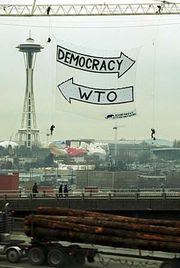 For starters here is a synopsis of what the WTO 1999 Seattle riots were all about. On November the 30, 1999 the WTO (World Trade Organisation) Ministeral Conference took place in Seattle.
For starters here is a synopsis of what the WTO 1999 Seattle riots were all about. On November the 30, 1999 the WTO (World Trade Organisation) Ministeral Conference took place in Seattle.The conference was accompanied by massive street protests from anti-globalization activists. The lowest estimates say that 40,000 people thronged Seattle streets opposing neo-liberalism in what was later nicknamed "The Battle of Seattle."
However, what caused great distress to the police and the town fathers weren't those who protested peacefully, but those who committed civil disobedience by being violent. The most violent clashes took place in Mandel's neighbourhood, Capitol Hill, the second most densely populated neighbourhood in Seattle.
Not only was the taking place of the conference under threat because of the riots, but also the talks because the developing countries couldn't take it anymore to be patronised and bullied by the USA and their like. The only thing the Americans wanted was to expand their agressive trade policy further not even stopping to think of its consequences to the cultures of the developing countries. Accordingly, the talks collapsed. Alas, after this 1999 WTO conference, the American policy of pure economic interest didn't come to an end.
Although I certainly do not support protesters who restore to violence while voicing their opinion (violence only provokes violence-a vicious circle), I do hold it to be of the utmost importance for people to fight for a fairer democratic system. Coming myself from a developing country, I'm sick and tired of the attitude of the USA towards any country which isn't as developed as them. Unfortunately, although protests certainly sensitise the public, not much can be done against America's policy as all the developing countries are dependent on America if they wish to become developed country. This is the curse of the poor.
Two compelling sites about the riots are:
http://www.answers.com/topic/wto-ministerial-conference-of-1999-protest-activity
http://observer.guardian.co.uk/global/story/0,,525093,00.html

Let's move on to a less riotous topic namely Canada. As I had known laughably little about this magnificent country before deciding to research, I was positively surprised by just how much I found out about it.
Canada is the second largest country by total area in the world and it is bordered by three oceans namely the Atlantic, Pacific and Arctic Ocean respectively. The country was founded in 1867 as an union of British colonies and it remained so until 1982 when Canada became independent. Today, Canada is part of the Commonwealth of Nations as a constitual monarchy with parliamentary democracy and Queen Elizabeth the II is the head of state of Canada.

The name Canada has its roots in the language of the St. Lawrence Iroquoians and it means "village" or "settlement". The country is made up of ten provinces namely Alberta, British Columbia, Manitoba, New Brunswick, Newfoundland and Labrador, Nova Scotia, Ontario, Prince Edward Island, Quebec, and Saskatchewan. Canada also has three territories (Northwest Territories, Nunavut and Yukon), but they enjoy a smaller degree of autonomy compared with the provinces.
As far as geography is concerned, boreal forests (taiga) permeat the country, ice is common in the Arctic, throughout the Coast Mountains, and the Saint Elias Mountains. The relative flat Prairies in western Canada are suitable as agricultural ground and the territory surrounded by the St. Lawrence River is were the majority of the population lives. The density of population is in Canada amongst the lowest in the world- 3,5 people per square kilometre.
 Economically speaking, Canada is one of the world's wealthiest nations with a high per capita income and low unemployment. What's more, Canada is one of the world's largest exporters of energy as it has vast natural deposits of gas and oil.
Economically speaking, Canada is one of the world's wealthiest nations with a high per capita income and low unemployment. What's more, Canada is one of the world's largest exporters of energy as it has vast natural deposits of gas and oil.
As far as the population is concerned, its number is steadily growing due to immigration and it amounted to 31,612,897 according to the 2006 census. Canada is also highly multicultural with 34 ethinc groups living there and with two official languages (English and French) which enjoy equal status in the state institutions.
All in all, a country worth visiting.
To find out more, visit:
http://en.wikipedia.org/wiki/Canada










































